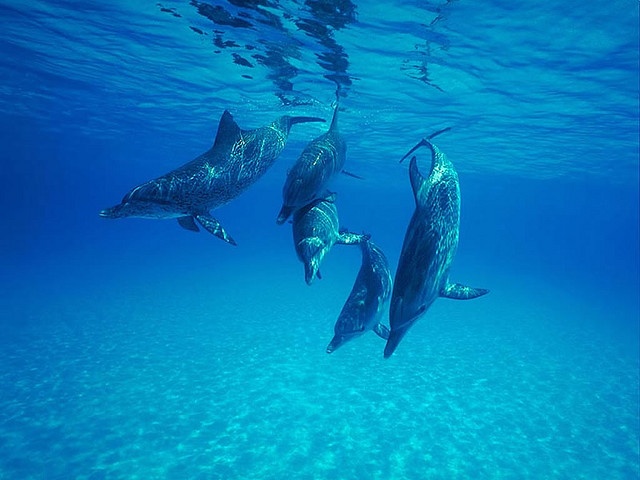We have much more to do and your continued support is needed now more than ever.
East Coast Dolphins Would Get Sonic Migraine from Proposed Drilling
Last week, the U.S. Department of Interior (DOI) took another step toward green lighting geological surveys for oil and gas drilling in the Mid- and South-Atlantic Ocean. With all the political backslapping over expanded drilling, few brought up that the excesses of the Deepwater Horizon calamity will now be heaped onto dolphins and other marine mammals on the Atlantic coast.
It’s a double whammy of trouble for them. First they’ll endure a barrage of painful and disruptive noise from the surveys, and should the oil platforms ever get built, their lives will be at risk daily from the inevitable spills. Two years after the BP Spill in the Gulf, have we failed to learn our lesson?
Blasts that Separate Mother and Calf

According to the Natural Resources Defense Council (NRDC), the cumulative noise of all sea-going vessels is an incessant drone of near-constant sound in a growing number of oceans regions. Seismic surveys, conducted during offshore oil and gas exploration, use rapid discharges of compressed air from air gun arrays. These send acoustic shock waves down through the water column that is reflected back from sub-sea rock strata. The blasts are emitted every 10 seconds and may be as loud as 250 decibels.
Other sources of acoustic pollution associated with offshore oil and gas activities include drilling, platform machinery, vessel traffic, low-flying aircraft and helicopters, and the movement of oil, gas or water through valves and under-sea pipelines. These intense sounds travel a long distance across the ocean. A 2009 workshop of experts, sponsored by Okeanos Foundation for the Sea, reported, “These surveys can last for months and the noise they produce is virtually ubiquitous in the world’s oceans.”
In the end, the most tragic thing may be the degrading of habitat. “Chronic ocean noise – the ubiquitous din of shipping and fishing vessels, seismic surveys, pile driving: all of it – slowly but surely degrades the quality of habitat available to acoustically sensitive species,” writes Dr. Rob Williams of Oceans Initiative. Unlike some of the more intractable threats facing aquatic life however, this one is very solvable he writes. We need to cut the noise, and that means turning down the volume on the underwater heavy metal concert, not turning it up.
Sick Dolphins Reported in Gulf

These dolphins have a low body weight, anemia, low blood sugar and symptoms of liver and lung disease. It is so serious that the fisheries arm of the National Oceanic and Atmospheric Administration (NOAA) declared an “unusual mortality event” for cetaceans (whales and dolphins) in the northern Gulf of Mexico from February 2010 to the present.
As of March 25, there were 706 cetacean “strandings” or beaching events of which five percent stranded alive and 95 percent stranded dead. Repeat: 95 percent dead. Even in the aftermath of the BP/Deepwater Horizon spill, we need to remind the oil and gas industry and its backers that seismic surveys and oil drilling can have huge consequences. After the BP spill, NWF Senior Scientist Doug Inkley said, “The Gulf oil disaster is to marine life what smoking is to humans – it could kill you, and if it doesn’t your general health suffers.”
We are still living with the legacy of the BP spill. In fact, some of the results are just emerging. Let’s not have a Deepwater Horizon disaster in the Atlantic.
![]() You can help NWF’s call for wildlife-friendly clean energy by donating to help us protect marine mammals and by learning more about our Gulf recovery efforts.
You can help NWF’s call for wildlife-friendly clean energy by donating to help us protect marine mammals and by learning more about our Gulf recovery efforts.




















